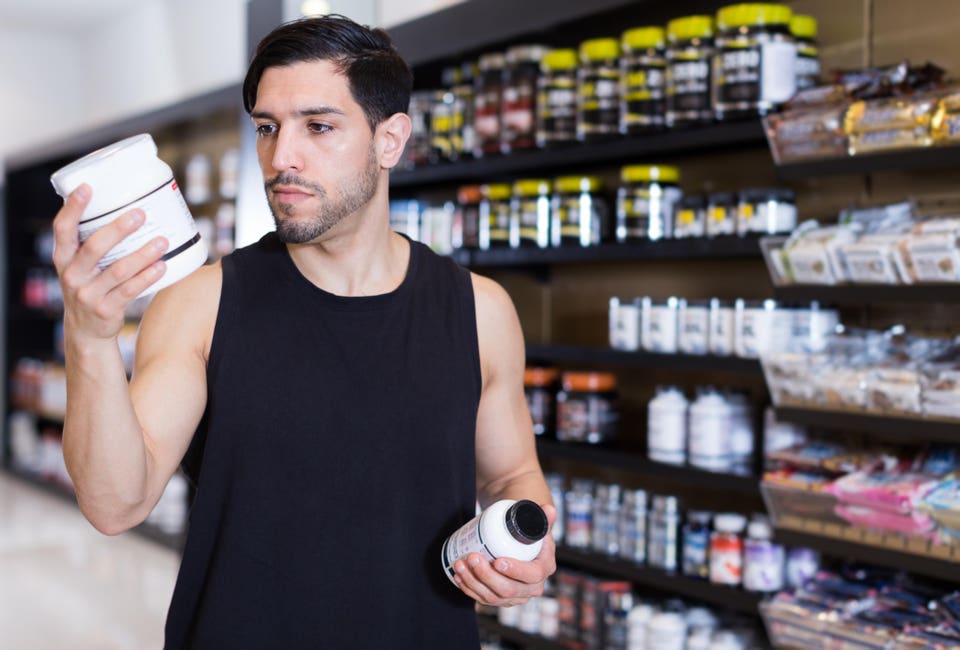Forbes Innovation Healthcare 89% Of Sports Supplements Tested Did Not Accurately Label Their Ingredients Bruce Y. Lee Senior Contributor Opinions expressed by Forbes Contributors are their own. I am a writer, journalist, professor, systems modeler, computational and digital health expert, avocado-eater, and entrepreneur, not always in that order.
Following Jul 18, 2023, 11:25pm EDT | Press play to listen to this article! Got it! Share to Facebook Share to Twitter Share to Linkedin Testing of 57 sports supplements revealed that 23 (40%) didn’t even have detectable quantities of . . .
[+] particular ingredients that were listed on their labels, as described by a research letter just published in JAMA Network Open. (Photo: Getty) getty What’s in your sports supplement? Maybe not what you think is in there. Testing of 57 sports supplements revealed that 23 (40%) didn’t even have detectable quantities of particular ingredients that were listed on their labels, as described by a research letter just published in JAMA Network Open .
In fact, a whopping 89% of these products had labels that inaccurately indicated the quantities of those ingredients. And seven (12%) contained at least one ingredient prohibited by the U. S.
Food and Drug Administration (FDA). Hmm, that’s not very sporting of those who have been selling such supplements. After all, a label of ingredients label isn’t supposed be like a Tinder profile and make inaccurate claims, right? Otherwise, what’s to prevent someone from listing things like pixie dust, moonbeams, Eye of Newt, and white truffles? Well, the challenge is that the FDA doesn’t regulate what’s listed on supplement labels the same way they do medications and many packaged foods.
So, unless you carry a liquid chromatography quadrupole time-of-flight mass spectrometer or some other way of verifying the ingredients in a supplement around with you, you are kind of relying on those who selling supplements to tell you the truth. JAMA Network Open did find one group of people with a liquid chromatography quadrupole time-of-flight mass spectrometer: a team from Harvard Medical School (Pieter A. Cohen, MD), the University of Mississippi (Bharathi Avula, PhD, Kumar Katragunta, PhD, Ikhlas Khan, PhD) and NSF International (John C.
Travis). For this study, they used this equipment to look for five ingredients that according to the study authors, “are promoted in dietary supplements for their stimulant or anabolic effects. ” These five were Rauwolfia vomitoria (whose extracts contain α-yohimbine), methylliberine (which is similar to caffeine), halostachine, turkesterone (a plant steroid), or octopamine (which is similar to norepinephrine).
The team ended up purchasing 63 different products and found that 57 of them had at least one of the five aforementioned ingredients listed on their labels. Specifically, 13 of the 57 had listed on their labels R. vomitoria , 21 of them methylliberine, eight of them turkesterone, seven of them halostachine, and eight of them octopamine.
The team mixed methanol with the powder from each of these products and then used—guess what—liquid chromatography quadrupole time-of-flight mass spectrometry to test the mixture to determine how much of these five ingredients were actually present and whether there were certain ingredients that have been prohibited by the FDA. MORE FOR YOU Brainiac Foods Contain Nutrients Believed To Support Brain Health Here’s what the research team found. While the hips don’t lie, according to Shakira, it looks like many of the labels did quite a lot of fibbing.
Only six of the 57 products (11%) actually had amounts of the ingredients that were within 10% of what the labels had said. This meant that 89% of the products had labels that weren’t telling the truth about how much of the ingredients were in the products. Plus, seven of the 57 products (12%) contained at least one ingredient that that would earn a big “no, no” from the FDA such as four different synthetic simulants, 1,4-dimethylamylamine, deterenol, octodrine, oxilofrine, and omberacetam.
Seven of the 57 products (12%) contained at least one ingredient that that would earn a big “no, no” . . .
[+] from the FDA such as four different synthetic simulants, 1,4-dimethylamylamine, deterenol, octodrine, oxilofrine, and omberacetam. (Photo: Getty) getty Of course, this study did have a bottle full of limitations. It used a convenience sample of supplements, which, in this case, doesn’t mean that they got the supplements from the convenience store.
Rather, the research team only looked at supplements that they were able to conveniently get online. It was also a relatively small sample. While 57 may seem like a lot when it comes to squirrels in your bathroom, it does not represent the totality of sports supplements out there.
So you shouldn’t simply label everyone producing and selling supplements as a liar. Nevertheless, the results did suggest that there is quite a lot of smoke and mirrors out there. Moreover, this wasn’t the first study to find that many sports supplements did not have accurate labeling.
A study published in JAMA Internal Medicine in 2013 as a research letter probably woke a quite of few people up to amount of caffeine that was in 20 different sports supplements. That study found that five of them had actual caffeine levels that varied by more than 10% from the amount listed on the label. These levels ranged from 27% to 113% of the labeled quantity.
News flash. People can lie. So you do have to approach supplements and claims about them as you might a profile on Tinder.
Someone can always say that he or she likes long walks on the beach and hates drama but really hates the beach and loves drama. Similarly, you may not be able to trust what a sports supplement label says, unless you happen to be carrying around a liquid chromatography quadrupole time-of-flight mass spectrometer. Follow me on Twitter or LinkedIn .
Check out my website . Bruce Y. Lee Editorial Standards Print Reprints & Permissions.
From: forbes
URL: https://www.forbes.com/sites/brucelee/2023/07/18/89-of-sports-supplements-tested-did-not-accurately-label-their-ingredients/



